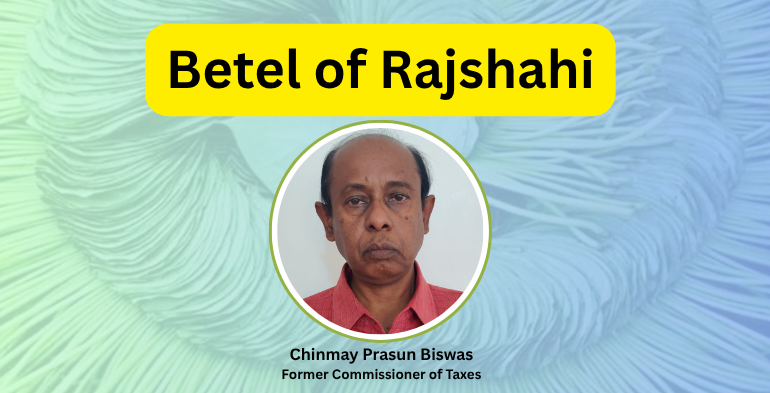
Chinmay Prasun Biswas:Betel is a very familiar thing to us. People chewing betel is a common sight in houses, public places, markets, offices, other working and public places. It is the leaf of a tropical vine. Aryans and Arabs call it tambul. People, mainly in South and Southeast Asia, the Gulf countries and the Pacific region chew betel. Not only as a habit but also as a part of social custom consumption of betel is a century-old tradition in this sub-continent. Serving betel after lunch or dinner is a common social practice. Production and marketing of betel-spices (with or without tobacco) is a big business in this sub-continent.
Betel is an important component in literature, film and music. In his poem দূরের পাল্লা Satyendranath Dutta has written –
পান বিনে ঠোঁট রাঙা চোখ কালো ভোমরা/ রূপশালী-ধান-ভানা রূপ দেখ তোমরা।
In a song (lyric – Gazi Mazharul Anwar, music – Subal Das) Runa Laila has sung - "পান খাইয়া ঠোঁট লাল করিলাম বন্ধু ভাগ্য হইল না"।
In a superhit Hindi film DON (starred by Amitabh Bachchan, Zeenat Aman, released in 1978) there was a very popular song (lyric- Anjaan and Indeevar, music- Kalyanji–Anandji) খাইকে পান বানারস ওয়ালা/ খুল যায়ে বন্ধ আকাল কা তালা (O khaike paan Vanaras wala/Khul jaye bandh akal kaa tala). Simply the meaning is - after eating the betel of Venaras lock of the mind opens up. It is known that at the time of recording this song Kishore Kumar was chewing betel. There are many other instances.
Away from these, betel has an economic importance. It is a cash crop in many places of Bangladesh. Betel is cultivated in many districts of the country but sweet and delicious betel of Rajshahi is probably the most famous. Betel leaves of Rajshahi are highly popular particularly for its sweetness which distinguishes it from betel leaves of other regions. In 2024 betel of Rajshahi has acquired GI (Geographical Indication) product recognition which has increased its importance. These betel leaves tasteful and high quality are also exported to many countries. Betel leaf cultivation is an important cash crop in Rajshahi having positive impact on local economy.
Although mango is the main cash crop of Rajshahi district, betel is gradually taking over that place. In Rajshahi the most betel leaves are cultivated in Mohanpur, Bagmara and Durgapur upazillas. Many people in Mohonpur Upazilla are still continuing betel cultivation as family tradition. They collect betel leaves from betel field, commonly known as পানের বরজ। and send directly to Dhaka. As there is no middlemen they get good price. Farmers were quite happy in getting record high price for betel in 2023 season. Then a good betel leaf was sold at Tk. 3/-. Ekdiltala Haat in Naogaon, beside the Naogaon-Rajshahi highway, is famous for betel trading. This haat sits on Saturdays and Wednesdays. During peak season more than Tk. 2 (two) crores of betel leaves are reportedly traded here. In 2023 a big bundle containing 2048 betel leaves was sold at Tk. 5,000/- to Tk. 6,000/-. Farmers are more benefitted from betel leaf cultivation than mango. According to farmers, not betel but money hangs in the betel field. It is the only carrier of their family economy. According to farmers, at least Tk. 80,000/- to Tk. 1,00,000/- is required to harvest betel in a one-bigha plot. But once the yield starts, it continues and makes it a very profitable agricultural crop.
However, there is other side situation also. According to a newspaper report of 10-8-2025, betel market has faced a serious collapse. Price of a bundle of small-size betel has abnormally dropped down to Tk. 5/- whereas a few months ago it was Tk. 50/-. Just within 15 days price of good quality large-size betel leaves has collapsed to Tk.30/- - 40/- from Tk.120/-.
Farmers and traders have referred to different reasons behind this unusual price-fall. They have cited price-hike of betel nut, an essential item taken with betel. They have also accused the authority of syndicates, excess supply, high production and ban on export. According to traders, increase of betel nut price has reduced consumption of betel by common people. Even betel leaves sent to Dhaka are lying unsold. Suppliers are afraid to buy betel due to fall of demand. According to them, price of a raw betel nut is Tk. 10/- to Tk. 15/-. Poor people there consume more betel but they cannot afford the price of betel nuts. Sweet betel of Rajshahi had a big market in Middle-East countries but due to different complications export is now almost closed. This is also another reason for price drop, according to concerned persons.
Farmers are in crisis due to fall in price of betel. Many families used to live on income from betel but now they are facing loss. As usual, many farmers have taken loans from NGOs or moneylenders to cultivate betel but due to price-fall they are extremely worried about repaying instalments. Farmers say that price of betel has been decreasing in recent months. Due to high-price of betel wages of workers and cost of inputs have increased. But as price has fallen, even cost of collecting betel from field is not covered up by sale price. So, betel is being wasted in fields.
Farmers say that cultivation of betel is not as easy as thought from outside. It is such a sensitive plant that problem arises when the sun hits this plant and rainwater accumulates. It is affected by various diseases. The most dangerous disease is root-rot. It destroys vines during rainy season. As complained by farmers, they do not get adequate cooperation from agriculture department to prevent these diseases. No special pesticide or medicine is available for betel leaves. So, they have to depend on pesticides of other crops. Betel farmers of this area demand a betel research centre. Experts think that if research-based cultivation is done, yearly Tk. 2- -- Tk. 3 lakhs per bigha can be earned from betel leaves. Considering the reasonability of this demand agriculture department decided to set up a betel research laboratory in 2011 but it has not been implemented during last 14 years.
The writer is a former Commissioner of Taxes
























